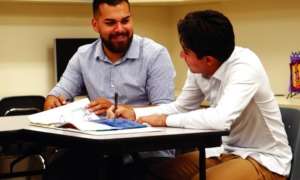By Amanda Ly, 18
LA Youth , Los Angeles
I always imagined myself on my own at a college far from home, seeing new places and experiencing new things. I felt I could go to any college I wanted because I had worked hard in high school. I realized I would be paying for my education, because my parents couldn’t afford to. But I figured I could get scholarships and grants and pay for the rest with loans.
Now that I look back, I realize I was too optimistic. I didn’t understand that the economy was so bad that it wouldn’t be that easy.
I didn’t put that much effort into finding the perfect school. I looked into colleges that contacted me, that I heard about from school presentations, and that my friends recommended. I wanted to attend a private school where classes are smaller so you can approach the professors and ask for help, and possibly a school with religious affiliations because I wanted to take theology classes.
I didn’t know much about financial aid. In January, our school guidance counselors came into our classes and gave us copies of the FAFSA (Free Application for Federal Student Aid) and explained the form. I knew it was how you apply for financial aid. They said, “Some of you will get loans. Some of you will get grants or scholarships.” I knew the private schools I had applied to cost more than public universities, but I thought I could get loans and pay them back later.
I was at a family dinner at my grandma’s on Lunar New Year when I got an e-mail welcoming me to the University of New Haven in Connecticut.
I turned to my cousin and said, “Oh my god Megan, look, I got in!” The cost of UNH for the 2009-10 school year was about $42,000, which included tuition, housing and meals. I received my financial aid award letter from UNH in May. Each semester I was to receive a $2,600 federal Pell Grant, $1,750 from a subsidized Stafford loan and $1,000 from an unsubsidized Stafford loan, plus a $9,000 grant from the university. Grants and loans covered 70 percent of costs. Each semester, I was expected to pay about $6,000.
I didn’t need to pay back the grants, but I understood I would have to pay back the Stafford loans, plus the private loans for the $6,000 I had to come up with each semester. But I did not add it up to figure out how much in loans I would need over four years ($70,000). I was just focused on paying for the first year.
The first time I visited UNH was for freshman orientation, the week after high school let out in June. I liked the small class sizes and academic opportunities like internships and study abroad. After orientation, I felt that it was the school for me. I thought, “I can make this work.”
When I came back from orientation, I started thinking about paying for college. Neither of my parents went to college, and they don’t speak English, so they didn’t understand how things work. During the first week of July, I went to Wells Fargo with my dad to apply for a private student loan. She [the loan officer] came back 10 minutes later and told us our request for a collegiate loan was denied because our household income was too low. As my dad and I were leaving, the loan officer said that right now, the economy is bad and they can’t give out as many loans as they used to. She said, “If you came a few years earlier you probably would have gotten it.”
I was sad. It seemed unfair. I’d done a lot of things, like taking AP and honors classes, doing community service and working part-time in a law office since I was 16. But because of the economy, I couldn’t come up with the money to go to the college I wanted. After that, I tried other student loan programs and got the same answer: I didn’t qualify. I contacted UNH and asked them for advice. They told me if I couldn’t pay tuition by Aug. 3, I should reconsider attending.
I continued to do the assigned summer reading as I tried to think of ways to attend. I applied for a couple of higher-paying jobs and scholarships, but I didn’t get them. I realized that UNH was not going to happen. A week after tuition was due, on Aug. 11, I finally called UNH to notify them of my decision to withdraw. Twice I dialed the number, let it ring once or twice, then hung up. On the third call, I finally found the courage to speak. After I told them of my decision, I felt sad and empty.
Now I live at home and attend a community college. I’m disappointed I’m not at UNH this fall. Yet at the same time, I understand that the economy makes it harder for people to get loans. Life can’t always be what you expect, even if you work really hard. You learn to move on.
© 2010 L.A. Youth, the newspaper by and for Los Angeles Teens, www.layouth.com.






























